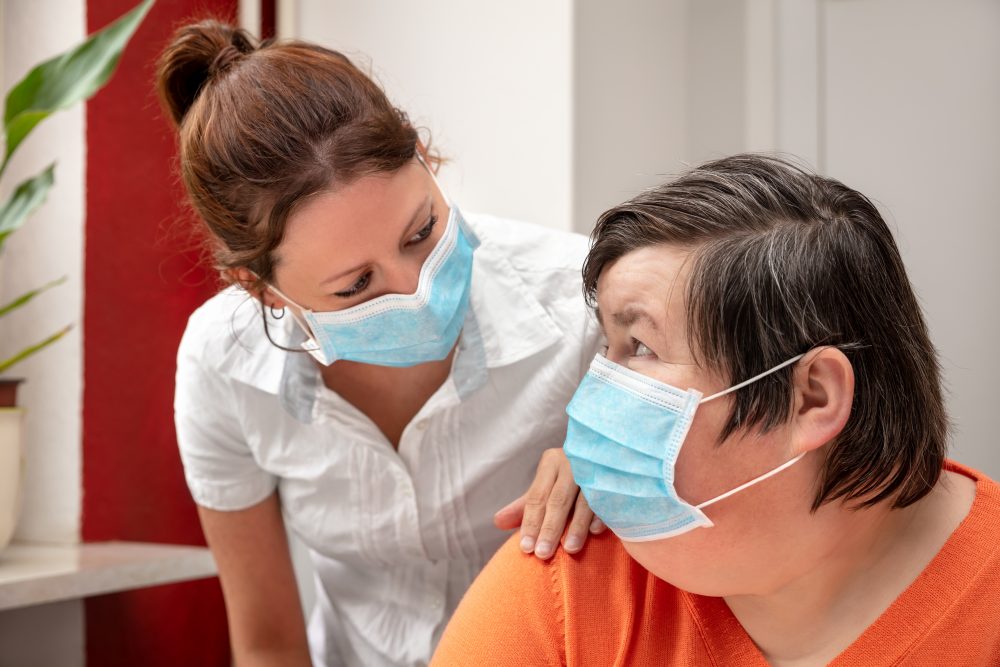COVID-19 is teaching us that the world as we know it can change overnight. No one is truly immune and that little things we’ve taken for granted are magnified when we can no longer easily have them.
We miss catching up with a close friend in our favorite coffee shop. We yearn for our book club where the evening is spent chatting, laughing, and occasionally getting around to discussing the book. We’re saddened by the delay or cancellation of birthdays, anniversaries, wedding, funerals, graduations, religious occasions, and other important milestones
While we practice social distancing, we learn the importance of social connectedness. This pandemic has provided us ample opportunity to examine our work around promoting friendships between people with and without disabilities. Here are some lessons that we are learning:
- It must now be crystal clear to nearly everyone that those people who are well-connected to others have been able to weather the isolation of this pandemic much better than those who are friendless. In an article in Slate entitled “Loneliness is Deadly,” author Jessica Olien writes, “Loneliness is breaking our hearts… [It] is a serious health risk” and social isolation is associated with many diseases including “type II diabetes and heart disease” and an “increased mortality risk.” There should be no doubt of the importance of our work.
- One-to-one matching efforts are likely more effective at producing the friendships that sustain people through hard times than mere membership efforts. If the connections made through membership organizations (such as churches, clubs, civic organizations, etc.) do not “transcend” the time and place of those activities, then connections are likely to fall apart when those groups are forbidden to gather together. Writing for Open Future Learning, Judith North emphatically suggests: “Get brave. Ask people in your community to help!”
- When people are connected (whether through one-to-one or membership approaches), early on there should be efforts to both gather and share contact information. Those people who have that information can reach out to others via phone call, texts, e-mails, video chats, snail-mail cards, and letters to keep the relationship going, and maybe even growing. Jack Yates, consultant to Pathways to Friendship, asks: “What could we help people to do now, and what might be included in a care package, which might pay off four months from now in a little closer connection with someone who is now just an acquaintance, but who might be invited gradually to be a real friend?”
- EVERYONE should have access to the technology now that helps people connect and the knowledge or support to use it. During COVID-19, online yoga classes have become as standard as virtual Zoom chats between groups of friends.
- Go old-school and encourage people who share a home to do activities together that strengthen their bonds and build skills like board games, puzzles, card games, karaoke, etc. Many of these activities are ones that can be used in the community to connect with others once the quarantines are lifted.
- There are numerous online resources that people can access for activities that can keep them busy and occupied while tethered to their home. But look for those resources that connect or reconnect two or more people, that aim to increase social connections and build social skills. An extensive and valuable resource while social distancing was developed by Pathways facilitator Phoebe Goodman and can be reviewed by clicking here.
- Support your local businesses, even while confined to home. For instance, can your organization contract with a local restaurant or delivery service to provide food to your homes, meeting your needs to safely procure goods and giving a lifeline to a struggling local business? Katie Driscoll, another Pathways facilitator, has shared that BAMSI, a large human service organization, has contracted with a local food service company to provide meals to 90 residential homes. The food service company, which normally provides meals to schools, is meeting urgent needs of people during COVID-19. Perhaps they would be grateful enough to consider hiring some people supported when the economy improves.
- Support your neighbors. You likely have neighbors who are elderly and/or live alone and/or are unemployed and/or are scared of going outside. Choose inter-dependency. Could you safely mow their lawns, plant some hopeful spring flowers, roll out their trash barrels, etc.? Could you pick up some groceries or drug store items for them? Such neighborliness during tough times will not be forgotten.
These may be times for physical distancing, but more than ever this is a time for social connections. As Judith North says, “Extraordinary circumstances offer extraordinary opportunities.”




